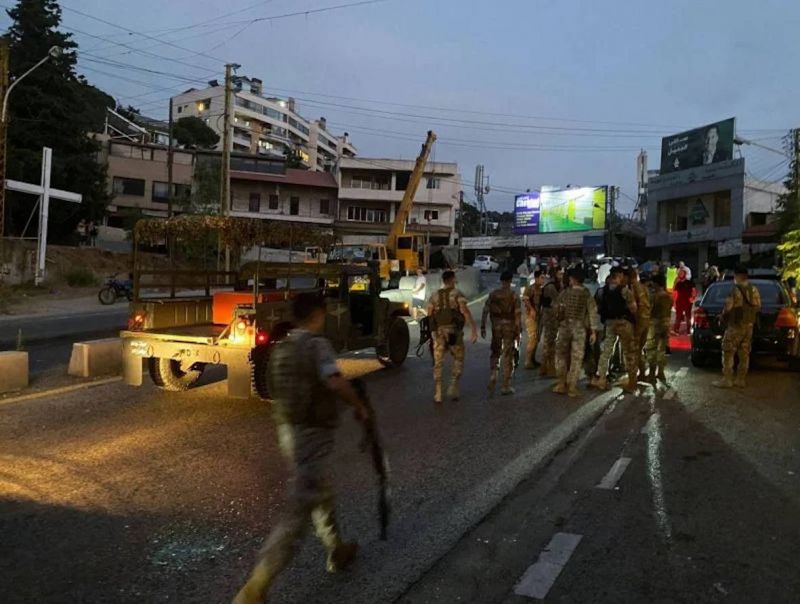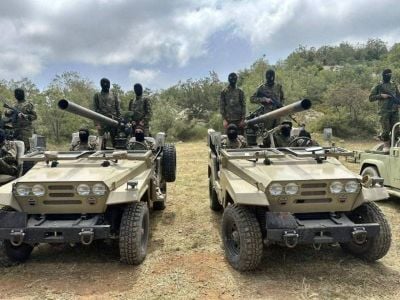
Lebanese soldiers deployed in Kahaleh after a Hezbollah truck carrying materiel overturned 9 August, and a following a firefight ensued, leaving at least two people dead. (Credit: Mohamed Azakir/Reuters)
On August 9, a truck carrying weapons and ammunition for Hezbollah accidentally overturned in Kahaleh, on the Damascus road. Clashes then occurred between party fighters and residents of the village, situated along the demarcation lines of the Civil War (1975-1990).
This incident is not insignificant. It illustrates a shift in Hezbollah’s attitude towards public opinion.
Its statement released that day did not bother to justify to the Lebanese people the transportation of weapons in broad daylight, nor did it explain to the residents of Kahaleh the intervention of armed men in a historically sensitive locality.
The statement was not aimed at public opinion but rather at an already supportive and partisan audience. The time has passed, it seems, when Hezbollah was concerned about gaining the support of a wider range of Lebanese.
What has happened? Why is Hezbollah risking losing the little support it still has beyond the Shiite community?
It’s important to understand Hezbollah today in order to confront it.
The limits of ‘Lebanonization’
The concept of “Hezbollah’s Lebanonization,” popular in the 2000s, illustrates the process of normalizing relations between many Lebanese political actors and Hezbollah.
It describes Hezbollah’s attempt to transform from a military organization organically linked to the Iranian Revolutionary Guards to a political party with local legitimacy.
This “Lebanonization” process aimed to appeal to all Lebanese, not only members of the Shiite community.
In February 2006, the agreement of understanding signed with the Free Patriotic Movement at Mar Mikhael church was a key moment in this process: the party aimed to portray itself as a peacemaker.
Another pivotal moment was the liberation of South Lebanon from Israeli occupation on May 25, 2000, an opportunity that Hezbollah seized perfectly: to reassure Christians and prevent any retaliatory attacks against border villages.
Hezbollah had established an image of respectability.
However, the kidnapping and murder of Lebanese Forces member Elias Hasrouni, in Ain Ibel in early August 2023, as well as repeated incidents in the locality pitting party members against residents, began to erode the political capital it had built.
Furthermore, Hezbollah's political choices have contradicted this supposed “Lebanonization” multiple times.
These include a series of assassinations (between 2005 and2013) that many Lebanese attribute to the party, the “mini-civil war” of May 2008, its military intervention in Syria since 2011 and, finally, its alleged role in the transport of ammonium nitrate to and from the Port of Beirut, making it culpable in the double explosion on Aug. 4, 2020.
Historically the party has presented itself as "anti-establishment," but its leader Hassan Nasrallah increasingly appears to be the protector of the political class, taking a hostile stance towards the popular protests of October 2019.
This sequence of events has gradually eroded the party’s image among the general public, regardless of their religious affiliations.
Weakened by the October 2019 uprising and the economic crisis, Hezbollah’s allies have also had to distance themselves from the party in order to better preserve what little legitimacy they have within their own communities.
This is exemplified by the case of the leader of the Free Patriotic Movement, Gebran Bassil, who was heavily criticized for providing cover for Hezbollah’s agenda. The party cannot no longer solely rely on alliances to achieve its goals.
Hezbollah’s position is paradoxical: it has never been so militarily powerful, yet it seems incapable of translating this power into political hegemony.
Unable to impose its candidate Sleiman Frangieh in the presidential election, Hezbollah is retreating into itself and appears to be taking immense, and unprecedented, risks.
What has changed? In the midst of significant regional negotiations, Hezbollah seems pressed by time. It wants to convert its military superiority into absolute dominance in Lebanon and appears willing to make mistakes.
However, Hezbollah is aware of the perils it faces, which also put all Lebanese at risk: civil war.
Breaking the deadlock
How can the country emerge from this impasse while grappling with an unprecedented political and economic crisis? Is the national dialogue proposed by some international actors, including France, an option to enable the “election of the president”?
The answer is both no and yes.
No, if it solely focuses on the presidential election, particularly because it would establish an extralegal practice to “select” a president and accept the ‘fait accompli’ of Hezbollah and its allies suspending the role of the Lebanese Parliament in electing a president according to the constitution.
The constitutional election of the president of the republic should be the key to dialogue.
In Lebanon, refusing to engage in dialogue is not an option. At a time when Hezbollah is aggressive and violent, courage lies in recognizing the gravity of the moment and preventing a civil war in the country.
However, any open dialogue must be premised on the undeniable realization that coexistence between Hezbollah arms and the state is no longer viable.
This dialogue must also be based on the principle of transitional justice that ensures justice for the victims of political crimes committed since the end of the Civil War, including the victims of the Aug. 4 2020 Beirut port explosion and political assassinations.
Recent events demonstrate that Hezbollah is anxious and seems caught up in its propaganda frenzy. Even more concerning, having definitively failed in its “Lebanonization” endeavor, it appears ready to return to its origins of the early 1980s: a politico-military movement that is more feared than respected (both in Lebanon and internationally), one that owes its survival to the use of force.
It is up to us to reject this return to the specter of civil war!
To achieve this, and as Hezbollah’s influence dwindles, it is time for a reformist and non-sectarian opposition to expand its reach beyond traditional community boundaries.
Naji ABOU KHALIL is a member of the National Bloc executive committee.
This opinion originally ran in French in L’Orient-Le Jour.
